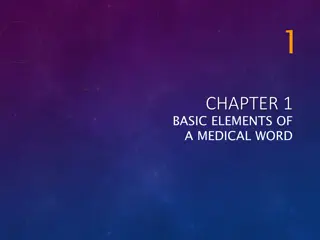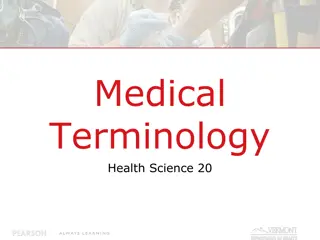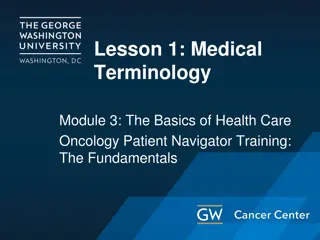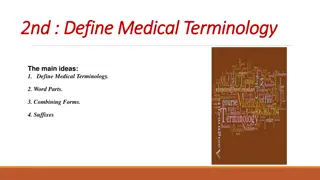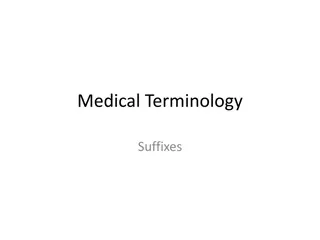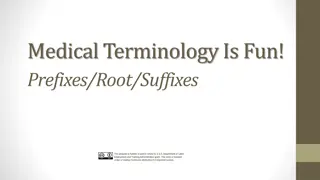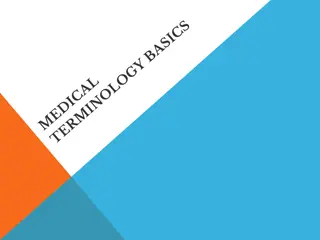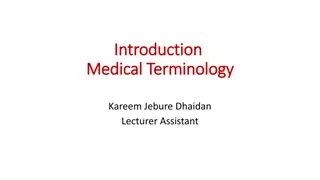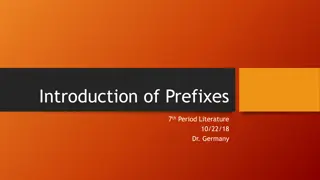Understanding Latin and Greek Prefixes and Suffixes in Medical Terminology
Explore the world of Latin and Greek prefixes and suffixes used in medical terminology. Discover opposites, word formations, and the meanings behind various prefixes. Test your knowledge with statements and synonyms, and practice forming terms based on definitions.
Download Presentation

Please find below an Image/Link to download the presentation.
The content on the website is provided AS IS for your information and personal use only. It may not be sold, licensed, or shared on other websites without obtaining consent from the author. Download presentation by click this link. If you encounter any issues during the download, it is possible that the publisher has removed the file from their server.
E N D
Presentation Transcript
1. FIND THE OPPOSITE 2. USE IT IN THE APPROPRIATE PHRASE and IN THE CORRECT FORM A. Neonatus .. masculinus, in grav. hebd. 39+2 B. Vasa .. C. Status post ablationem .. mammae l. sin. propter carcinoma D. Pars .. plexus brachialis E. Amputatio phalangis .. digiti II manus dextrae F. Operatio longa et .. tumoris maligni G. Cystis .. lat. dx. H. Fetus .. post abortum illegalem in grav. hebd. 24+2 I. Periodus .. sine complicationibus J. Symptomata .. morborum 1. facilis 2. dissimilis 3. proximalis 4. intrarenalis 5. supraclavicularis 6. vivus 7. efferens 8. postnatalis 9. sanabilis 10.totalis 11.immaturus K. Patiens cum morbo ..
FIND WORS WITH PREFIXES, EXPLAIN THEIR MEANING 1. Dolores in hypogastrio post appendectomiam ante dies IV (quattuor) factam 2. Hypertrophia prostatae, tumor prostatae suspectus 3. Fibrillatio cordis chronica. Dyspnoe. Morbus hypertonicus cordis. Hypercholesterolaemia 4. Haematoma periorbitale l. sin. 5. Infractio partis distalis ulnae suspecta 6. Injectio antitetanica post vulnus morsum 7. Embolia arteriarum pulmonalium recidivans 8. Status post resectionem ilei. St. post excisionem tumoris pelvis minoris 9. Obstructio postinflammatoria auris l. dx. 10.Decubitus permagni parasacrales
DECIDE WHETHER THE FOLLOWING STATEMENTS ABOUT LATIN/GREEK PREFIXES ARE TRUE OR FALSE ? 1) Dis-is used for a disorder and dys-for division or removal/loss again (e.g. anatomia, anamnesis). afferentia). through and between (e.g. diagnosis, diameter, diaphragma). 2) The Latin equivalent to the prefix endo- is extra-. 3) The prefix ana-has two meanings: division and 4) The prefix af- is a variety of the prefix ab- (e.g. vasa 5) The prefixes ante- and anti- have the same meanings. 6) The prefix hyper-means deficient or decreased . 7) The prefix dia-has three meanings: division ,
1) GIVE GREEK SYNONM TO LATIN PREFIXES 2) FORM TERM WITH THESE PREFIXES BASED ON DEFINITIONS Located above the clavicle: Located in the upper region of the abdomen: HYPER- SUPRA- Situated in time after the operation: Spread of malignant tumor cells: META- POST- Situated in time before the birth: A prediction of the course and outcome of a disease: PRO- PRAE- A liquid injected into the body: Brain: EN-/EM-/ IN- Located under the shoulder blade: State of lowered core temperature: HYPO- SUB- A muscle that serves to straighten (extend ) a part of the body: Cutting out: EK-/EC- E-/EX- Injection given directly into a muscle: The innermost layer of tissue that lines the chambers of heart: ENDO- INTRA- Located around the mouth: A dense fibrous membrane covering the surface of bones: PERI- CIRCUM-
AUTHENTIC CASE 1 Defectus visus Dislocatio Extractio Implantatio Intraocularis Luxatio Subluxatio A 30-year-old man presented with sudden vision impairment in his right eye 1 hour after vigorous exercise. Slit-lamp examination revealed anterior displacement of the lens. The patient underwent surgical removal of the lens, anterior vitrectomy, and an iris-fixated lens was placedwithin his eye. Rupture of the zonular fibers (which hold the lens in place) may result in complete dislocation or partial dislocation of the lens and could be caused by trauma or other pathologic conditions.
1) MATCH THE SUFFIXES WITH THEIR MEANINGS IN THE OVAL. 2) DECIDE WHETHER THESE SUFFIXES ARE USED TO DERIVE NOUNS OR ADJECTIVES + GIVE THE NUMBER OF THEIR DECLENSIONS. -iasis -alis -icus -atus -itas -ia -oma -itis -osus disease full of relation (a Latin suffix) equipped with inflammation state disease/pathological state relation (a Greek suffix) tumour
USE THE SUFFIXES IN THE BOX TO DERIVE ADJECTIVES FROM THE GIVEN NOUNS: -alis -aris -inus -eus -aneus -icus -arius
USE THE SUFFIXES IN THE BOX TO DERIVE ADJECTIVES FROM THE GIVEN NOUNS: -alis -aris -inus -eus -aneus -icus -arius
FORM THE PHRASES AND MATCH THEM WITH SHAPES/LETTERS 1. os + cuboideus, a, um 2. musculus + deltoideus, a, um 3. articulatio + sphaeroideus, a, um 4. linea + trapezoideus, a, um 5. regio + ellipsoideus, a, um 6. ossa + sesamoideus, a, um 7. tuberculum + conoideus, a, um 8. musculus + rhomboideus, a, um 9. os + hyoideus, a, um , C 10. colon + sigmoideus, a, um
FORM ADJECTIVES WITH THE MEANING SIMILAR TO FROM THE FOLLOWING NOUNS: Sigma (Greek letter ) Pteryx, gen. pterygos (wing): Thyreos (shield) Lambda (Greek letter ): Skafe (boat): Xifos (sword):
FILL IN WHAT IS MISSING TO GET PAIRS OF WORDS arteriola tuberculum arteria ........................ ....................... capitulum glans........................ ........................nodulus vena........................ ........................cerebellum pes........................ ........................ductulus septum........................ ........................areola cutis........................ ........................fossula fossa tuber.......................... .................... frenulum lobus........................ .....................valvula os................................ .................... geniculum canalis........................ ........................alveolus anus........................ ........................caliculus corpus........................ ........................lingula lingua caput frenum glandula lobulus nodus valva venula ossiculum cerebrum genu canaliculus pediculus ductus alveus anulus septulum calix area cuticula corpusculum
FOLLOW THE EXAMPLE TO FORM NAMES OF INFLAMMATIONS STEM ENDING-itis + -itis INFLAMMATION endometritis endometrium endometr- cervix bronchos cystis hepar colon nephros myocardium encephalon larynx gaster + + + + + + + + + + cervicitis bronchitis cystitis hepatitis colitis nephritis myocarditis encephalitis laryngitis gastritis sinusitis !!!! Ophthalmia !!!! Pneumonia sinus ophthalmos pneumon sinus ophthalmos
FORM NEW WORDS WITH THE GIVEN MEANING related to the brain small brain related to the small brain Cerebrum related to the liver inflammation of the liver cancerous tumor in the liver a degenerative disease of the liver Hepar Spina related to the spine or thorn full of thorns provided with thorns found above the thorny processes
FORM NEW WORDS WITH THE GIVEN MEANING Cellula pertaining to the cell located outside the cell located inside the cell full of cells cells inflammation related to the head provided with heads small head Caput located in the proximity of this organ related to the nose Nasus
FORM NEW WORDS WITH THE GIVEN MEANING mucous membrane inside the womb inflammation of the mucous membrane inside the womb the lateral extension of the uterine connective tissue into the broad ligament Metra (womb) Arthron (joint) inflammation of joints degenerative disease of joints one that suffers from the inflammation of joints// related to that disease
1) DIVIDE EACH TERM INTO ITS COMPONENTS. 2) WRITE THESE COMPONENTS INTO BOXES IN THE TABLE. YOU MAY NOT NEED ALL OF THE BOXES PROVIDED: terms prefix root 1 root 2 suffix 1 suffix 2 periorbitalis graviditas cholelithiasis posttraumaticus superficialis parotitis catarrhalis epigastricus anaemia praecarcinoma exsanguinatio reanimatio
DECIDE WHETHER THE FOLLOWING STATEMENTS ABOUT LATIN/GREEK SUFFIXES ARE TRUE OR FALSE ? 1) It is possible to distinguish noun and adjective suffixes (e.g. obesitas, tonsillaris). (e.g. arthrosis, flexura, ligamentum). the bigger size. which it comes from (e.g. canalis canaliculus). used to express relation to the noun. usually used to name bones. character of disease (e.g. coffeinismus, strabismus) 2) The ending of the suffix determines the declension 3) The diminutive is a word which relates to an object of 4) The diminutive always keeps the gender of the word 5) It does not matter whether the suffix -alis or -aris is 6) The suffix -or has the meaning of an agent and is 7) The suffix -ismus has two meanings: dependence or





